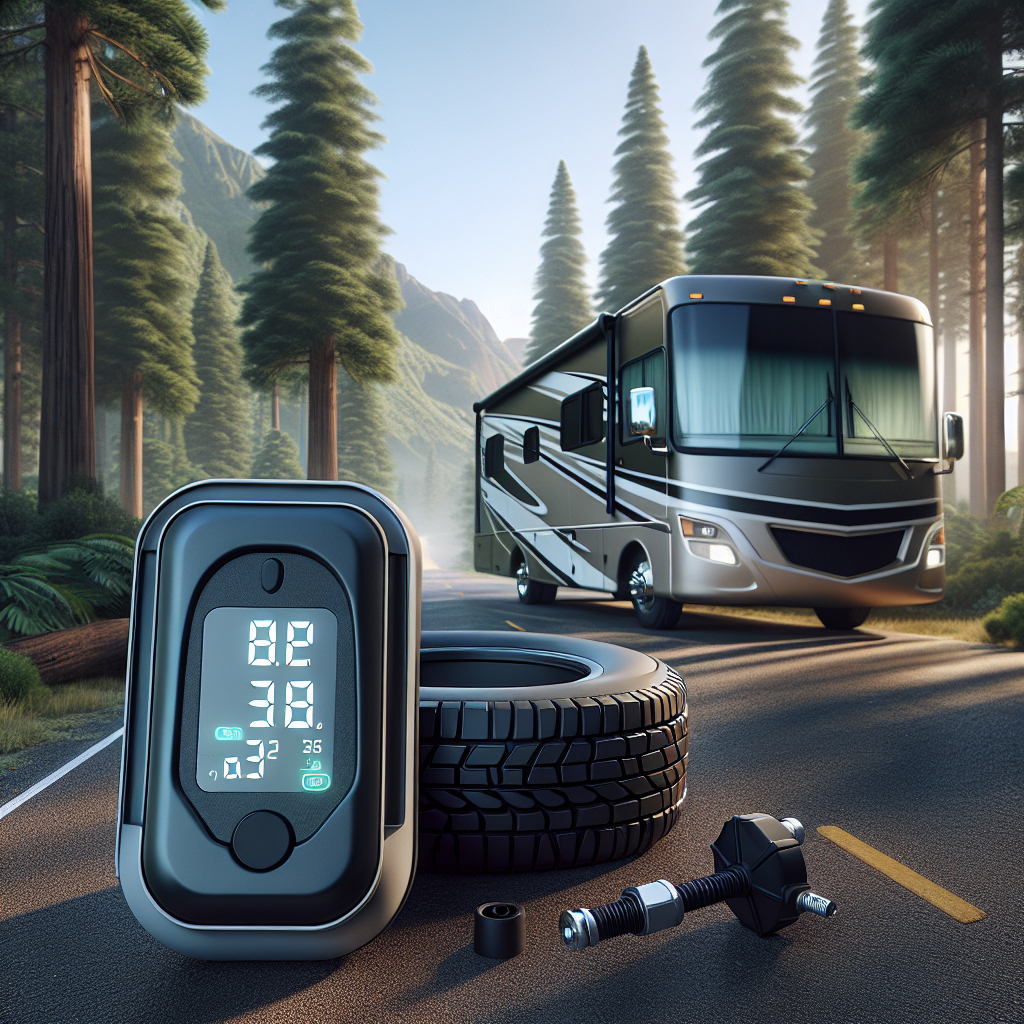When it comes to ensuring the safety and performance of your RV trailer, understanding the role of a TPMS sensor for RV trailer is crucial. A Tire Pressure Monitoring System (TPMS) sensor is designed to constantly monitor the air pressure within your trailer's tires, providing real-time data to help prevent tire-related issues while on the road.
These sensors work by measuring the tire pressure and temperature, alerting you immediately if any tire falls below the recommended pressure threshold. This early warning system is essential, as improper tire pressure can lead to:
- Tire blowouts due to overheating or excessive wear
- Poor fuel efficiency caused by underinflated tires
- Unstable handling affecting your driving experience
Moreover, the integration of a TPMS sensor adds a layer of intelligence to your trailer, transforming it into a smart trailer that not only protects your investment but also enhances your travel experience. With features that allow for remote monitoring, you can keep tabs on your tire health without having to pull over.
To ensure your RV trailer is equipped for the journey ahead, consider investing in a reliable TPMS sensor. Tow with peace of mind, knowing that trailerwatchdog is standing guard.
Key Benefits of Using a TPMS Sensor
Utilizing a TPMS sensor for RV trailer comes with a multitude of advantages that enhance both safety and performance during your travels. Here are some key benefits of integrating a TPMS sensor into your RV trailer:
- Enhanced Safety: By monitoring tire pressure in real-time, you can significantly reduce the risk of tire blowouts, which can lead to accidents and costly repairs.
- Improved Fuel Efficiency: Properly inflated tires maximize fuel efficiency, helping you save money on fuel costs during long road trips.
- Extended Tire Life: Maintaining optimal tire pressure can prevent uneven wear and tear, ultimately extending the lifespan of your tires.
- Convenience: With a TPMS sensor, you receive alerts directly to your dashboard or mobile device, allowing you to address issues proactively without having to stop frequently to check tire pressure manually.
- Peace of Mind: Knowing that your tires are being monitored continuously allows you to focus on enjoying your journey rather than worrying about potential tire issues.
Incorporating a TPMS sensor into your RV trailer not only ensures a safer driving experience but also enhances the overall efficiency of your travels, making it an essential investment for any RV owner.
Preventing Tire Blowouts with TPMS Technology

Tire blowouts can be one of the most dangerous incidents that can occur while on the road, especially for RV trailers that carry significant weight. Fortunately, implementing TPMS technology can play a crucial role in preventing these catastrophic events. Here’s how:
Real-Time Monitoring: TPMS sensors continuously monitor the tire pressure and temperature, providing real-time data that alerts you to any fluctuations. This immediate feedback allows you to address issues before they escalate into a blowout.
Early Detection: Many tire blowouts are triggered by under-inflation or overheating. TPMS technology can detect these conditions early, warning you to take action—whether it's adding air or checking for other underlying issues.
Data Analysis: Advanced TPMS systems not only monitor current tire conditions but also analyze historical data. This information can help you identify patterns and take proactive steps to mitigate risks, such as replacing tires that frequently show signs of pressure loss.
Enhanced Reaction Time: With alerts sent directly to your dashboard or mobile device, you have more time to react to potential problems. This capability is especially important when towing a heavy trailer, as managing a blowout safely requires quick thinking and precise action.
By leveraging TPMS technology, you can significantly reduce the likelihood of tire blowouts, ensuring a safer and more enjoyable travel experience.
How TPMS Enhances Road Safety for RVs

Ensuring road safety for RVs is paramount, especially when traveling with family or friends. TPMS (Tire Pressure Monitoring System) technology plays a vital role in enhancing safety on the road by providing critical information to the driver. Here’s how:
Consistent Tire Pressure: Maintaining the correct tire pressure is essential for safe driving. Under-inflated tires can lead to compromised handling and increased stopping distances, while over-inflated tires can cause blowouts. A TPMS alerts you to tire pressure changes, allowing you to adjust accordingly and maintain optimal performance.
Temperature Monitoring: In addition to pressure, TPMS also monitors tire temperature. Excessive heat can indicate potential problems, such as low pressure or tire wear. By receiving alerts about rising temperatures, you can take preventive measures before it leads to a failure, significantly enhancing safety.
Improved Handling and Stability: Properly inflated tires contribute to better handling and stability, especially in challenging driving conditions. TPMS helps achieve this by keeping you informed about tire status, allowing for a smoother driving experience and reducing the risk of accidents.
Confidence on Long Journeys: For RV owners, long road trips are common. With a TPMS installed, you can travel with peace of mind, knowing that your tires are being monitored. This confidence allows you to focus on enjoying the journey instead of worrying about potential tire issues.
By integrating TPMS into your RV, you are taking a significant step toward enhancing road safety, making your travels not only safer but also more enjoyable.
Choosing the Right TPMS for Your RV Trailer

Selecting the right TPMS (Tire Pressure Monitoring System) for your RV trailer is crucial to ensure optimal performance and safety on the road. With various options available, it’s essential to consider several factors to make an informed decision:
- Compatibility: Ensure that the TPMS you choose is compatible with your specific RV trailer model. Some systems are designed for specific types of trailers, while others offer universal fit.
- Sensor Type: There are two main types of TPMS sensors: direct and indirect. Direct sensors attach to each tire and provide real-time data, while indirect systems use the vehicle's ABS to estimate tire pressure. Direct sensors are generally more accurate and preferred for RVs.
- Monitoring Range: Consider the monitoring range of the TPMS. A system with a broader range allows for better monitoring of multiple tires over longer distances, which is particularly important for larger RV trailers.
- Display Features: Look for a TPMS with a clear, easy-to-read display that shows tire pressure and temperature simultaneously. Some systems even offer alerts and notifications for low tire pressure or high temperature, enhancing safety.
- Installation Process: Evaluate how easy it is to install the TPMS. Some systems are user-friendly and can be installed without professional help, while others may require technical expertise.
By considering these factors, you can choose a TPMS that best meets your needs, ultimately enhancing the safety and efficiency of your RV trailer. Remember, investing in the right monitoring system is an investment in your safety and peace of mind on the road.
Maintenance and Troubleshooting of TPMS Systems

Proper maintenance and troubleshooting of your TPMS (Tire Pressure Monitoring System) are essential to ensure it functions effectively and reliably. Here are some key practices to keep in mind:
- Regular Checks: Frequently check the system for any alerts or warnings. This includes monitoring tire pressure readings and ensuring that no warning lights remain illuminated on your dashboard.
- Battery Maintenance: Most TPMS sensors have batteries with a limited lifespan. Be sure to replace sensor batteries as needed, typically every 5-10 years, depending on usage and manufacturer recommendations.
- Sensor Calibration: Some systems may require periodic calibration to maintain accuracy. Refer to the manufacturer’s instructions on how to recalibrate your TPMS for optimal performance.
- Cleaning Sensors: Dirt and debris can affect sensor performance. Regularly clean the sensors and ensure they are free from any obstructions.
- Tire Maintenance: Maintain proper tire inflation and perform regular visual inspections of your tires. A well-maintained tire contributes to the accuracy of the TPMS.
In case of any issues, refer to the troubleshooting guide provided by the manufacturer. Common problems may include loss of signal, inaccurate readings, or malfunctioning sensors. If a problem persists, contacting a professional or the manufacturer for assistance is advisable.
By following these maintenance guidelines, you can enhance the longevity and reliability of your TPMS. Tow with peace of mind, knowing that trailerwatchdog is standing guard. Visit trailerwatchdog.com for more information on how our system can protect your RV trailer.








